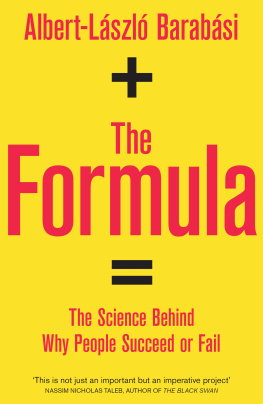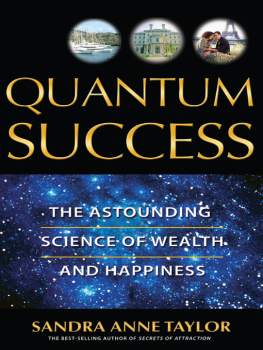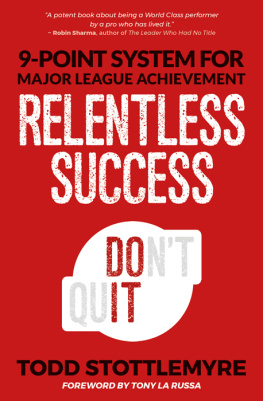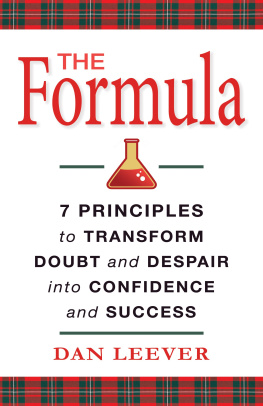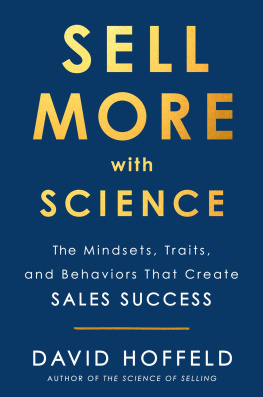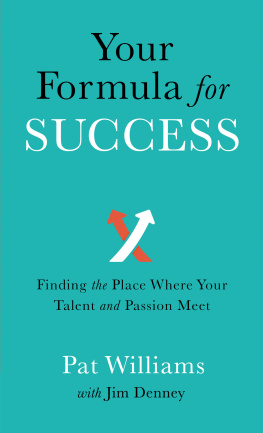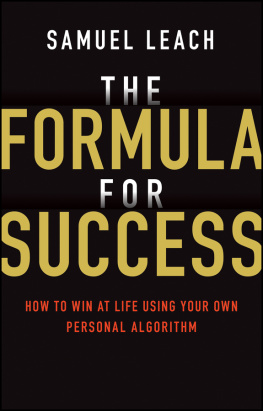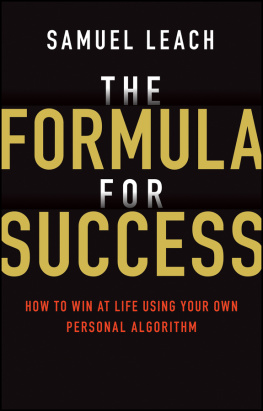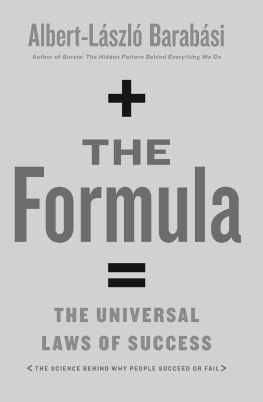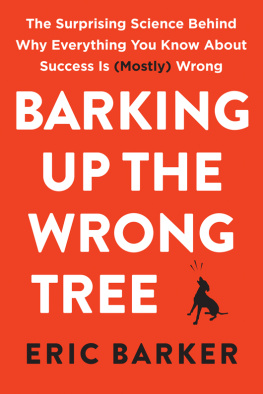Contents
INTRODUCTION
Success Isnt About You.
Its About Us.
My wife says she fell in love with me because I knew the temperature of the sun. I met her in a coffee shop while preparing to teach my students the basics of thermodynamics. How could we possibly know such a thing? she asked. The idea that I could pin a number 5,778 kelvin, to be precise on something so far away, something so untouchable, so violently, immeasurably incendiary seemed like a magic trick. Its the kind of answer any parent would love to supply to the questions kids tend to ask. Instead, we admit, I dont know, or speak in vague terms. The sun is hot. Really hot. But were talking about the glowing orb that illuminates our lives, the source of life as we know it. I found it baffling as a child that adults knew precious little about something so big.
My grandfather owned a fleet of trucks in his small Transylvanian village, but by the time I came along, all he had left of his business was his machine shop, a cavernous wooden shack where I spent every one of my vacation days. I loved that shop, which was in some ways my first laboratory, a place where I could safely break something down to its nuts and bolts, study its gears, and see exactly how it operated. Understanding what made something work that was the fascination. It still is.
I come from a family of tinkerers. After Communism robbed my grandfather of his fleet of trucks, he fixed appliances for the whole neighborhood, examining the innards of an iron or a radio with patient confidence. My dad, a truck driver for the family business at a mere ten years old, could crawl underneath an ailing car, poke around for a few minutes, and emerge with blackened fingers and a pleased expression, the problem fixed. He spent his life always running something a school, a museum, a company approaching each job with the mind-set of a tinkerer, rolling up his sleeves and making it work no matter the circumstance.
Maybe its a tinkerers curiosity that turned me into a scientist. Early on, physics allowed me to explore the sprockets and gears of the universe and the very forces that control our lives. Looking for more challenges, I turned later to the complexities of networks and data. For a vigilant asker-of-questions, Ive chosen the right corner of the scientific world to call home. As long as a line of inquiry is based on numbers the more the merrier I can pursue it doggedly, following its scent through the maze of data now available to researchers in our hyper-connected, technological world. Hunting down an answer inevitably leads to more questions, new possibilities that hover like gnats on the periphery of any research I conduct. I try to swat them away and stay focused on the task at hand, but Im not that different from the kid I once was, stubbornly asking Why? in response to... well, pretty much anything. It is the quest for answers that gets me up in the morning and keeps me up at night.
These days I run the Center for Complex Network Research, in Boston, where my job is exploring the why behind topics as varied as how people or molecules interact, where and how links form, and what our interconnectedness can tell us about society or our biological origins. Weve examined the topology of the World Wide Web. Were looking at how tiny hiccups in our genetic networks lead to disease. Were exploring how our brains control their billions of neurons and how molecules in food attach to our proteins, ensuring our long-term health.
I love this kind of stuff the math behind our social fabric, the way numbers provide a framework for understanding the essence of our connectedness. When I use models and tools to delve into unlikely topics for scientific analyses, these frameworks inevitably deepen our knowledge.
Thats precisely what we did with success. It took a few years, but after harvesting mountains of data on human accomplishment, we figured out a way to break the concept down to its constituents and study its gears. Our goal was to formulate success as a mathematical problem that computer scientists and physicists, using the unforgiving tools of quantitative science, could address in a definite fashion. It wasnt that different from pulling apart a bike, or using thermodynamics to fathom solar heat. Once we started seeing the mechanisms that create success, we began to answer the kinds of impossible questions I tortured my parents with as a child.
Exactly how, for instance, did we decide that this the blurry, unremarkable photo hanging in the Museum of Modern Art is a masterpiece?
Why is Carousel, not Cats, the best musical ever?
Are expensive schools worth it?
Why are there a mere handful of superstars in any field?
Add these to the hundreds of other questions about success, achievement, and reputation that seem, like the suns temperature, impossible to pin down. Is it our performance that pushes us up the corporate ladder? Do we get less or more creative over our lifetimes? Should we collaborate or compete with superstars? How do networks social and professional affect our access to success?
Believe it or not, quantitative answers can be found for all these seemingly unquantifiable questions. By examining the patterns in the data and identifying the mechanisms that produce success, we determined that we could address each of the questions head-on. Once we began to comprehend the universal forces at work behind our individual successes and failures, fascinating findings started to emerge.
*
We started with disaster, backhandedly landing on success. At the time, my lab was analyzing cell phone data to understand how people react to major catastrophes. Recognizing that this was a good opportunity for one to learn by doing, I assigned Dashun Wang, a gregarious, Chinese-born Ph.D. student, to help with the ongoing project. The endeavor resulted in a truly fascinating paper, one that I was certain would have a major impact on disaster relief efforts worldwide.
Except... no one else thought so. Try as we might, we couldnt get it published. The highest-tier and then some of the lowest-tier journals rejected it. We joked that we should have removed the word disaster from the title, since that likely destined it for failure.
A lifelong basketball player, Dashun shrugged off our disastrous paper as if it were a setback on the court. The ironies amused him. But when he and I met one night to discuss his next project, he was eager to move on.
Ill do pretty much anything but work on another disaster, he said with a chuckle.
Then lets make your next project a success, I said. How about the Science of Success?
Id meant the question to be tongue-in-cheek. Except as soon as I said it, we both knew that wed stumbled onto something interesting. Why not apply our methods to the study of success? It seemed that studying success would not be all that different from studying catastrophe. We can accurately predict the trajectory of a hurricane by examining a big pile of data points and using them as input for weather models. These predictions are hugely valuable in developing a response plan. Communities that lie in a hurricanes projected path prepare to batten down the hatches; the rest get ready for sprinkles and buy umbrellas. We dont question the validity of the forecast, though a century ago prophesying a monumental storm would have seemed like witchcraft. Why, then, couldnt we do something similar with success? Data collected in unexpected realms and filtered through sophisticated mathematical models, after all, can seem like a kind of magic.

